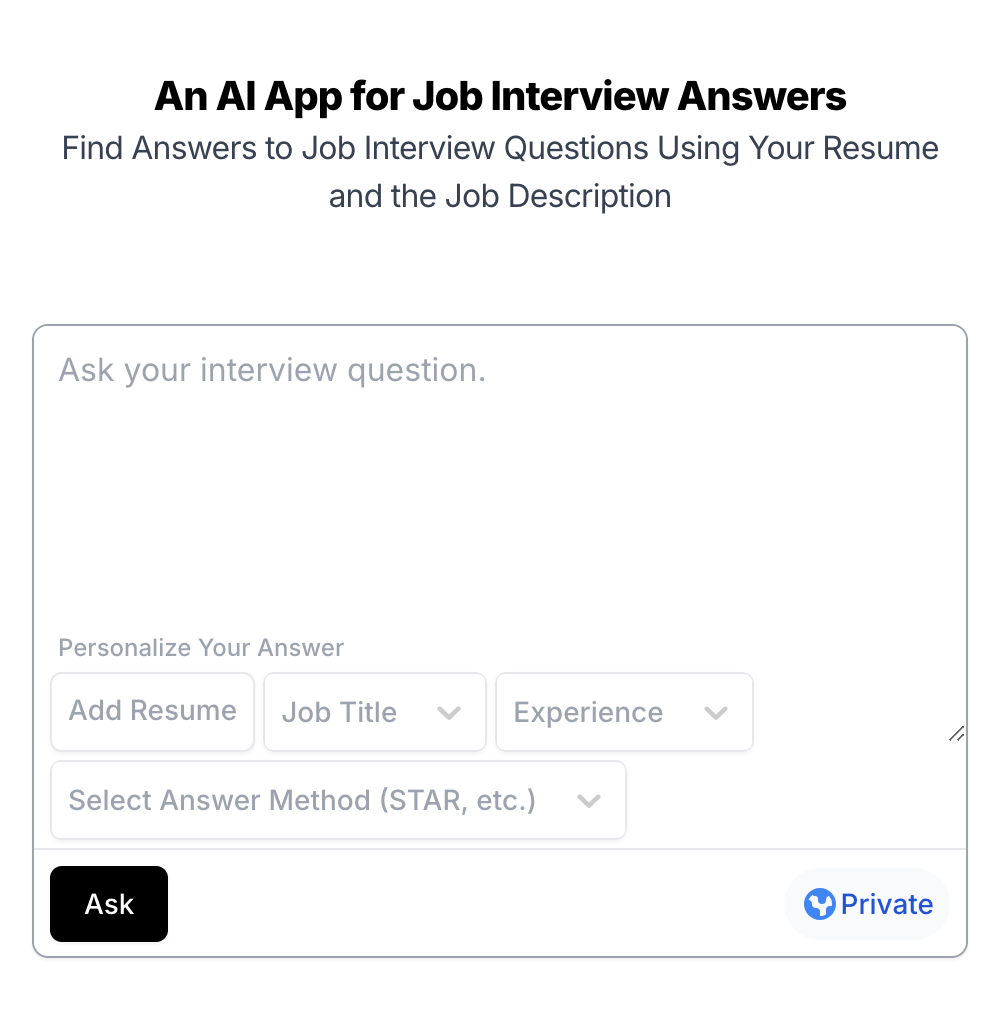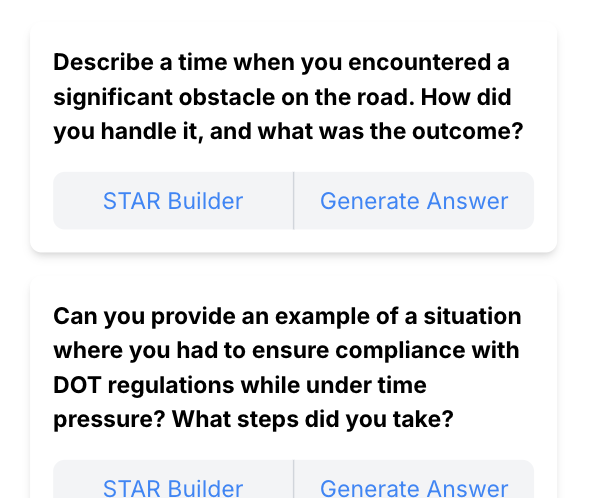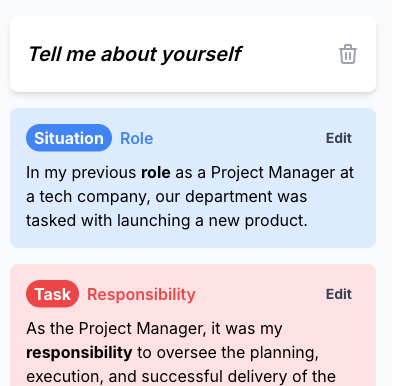
Situational Interview Questions: What You Need to Know
Fri Aug 23 2024•Author: InterviewPro AI
Table of Contents
- What Are They?
- Common Examples
- Answer Length
- What to Avoid Saying
- Possible Follow-Ups
- More Follow-Up Questions
- When They're Asked
- Who Asks Them
- Why They Matter
- How to Answer Well
- Answer Structure
What Are They?
Situational interview questions ask how you'd handle specific work scenarios. Employers use them to see how you'd react in real job situations. They want to know about your problem-solving skills, decision-making, and how you deal with workplace challenges.
5 Common Examples
- How would you handle a customer who's angry about a late delivery?
- What would you do if you noticed a safety hazard at work?
- How would you manage a project that's falling behind schedule?
- If a team member wasn't pulling their weight, how would you address it?
- What would you do if you made a mistake that could cost the company money?
Answer Length
Aim for about 1-2 minutes per answer. This gives you enough time to explain your approach without going on too long. Your answer should show your thought process and problem-solving skills clearly and concisely.
What to Avoid Saying
Don't say these things when answering situational questions:
-
Don't give vague answers Bad example: "I'd handle it professionally." (when asked about dealing with a difficult coworker) Why it's bad: This doesn't show your specific approach or problem-solving skills.
-
Don't say you've never faced such a situation Bad example: "I've never had to deal with that before." Why it's bad: This suggests a lack of experience or inability to think hypothetically.
-
Don't propose unethical solutions Bad example: "I'd change the numbers to make the project look on track." Why it's bad: This shows poor judgment and lack of integrity.
-
Don't avoid responsibility Bad example: "I'd let my manager handle it." Why it's bad: This suggests you're not willing to take initiative or solve problems.
-
Don't give extreme responses Bad example: "I'd immediately fire the underperforming team member." Why it's bad: This shows a lack of patience and poor people management skills.
-
Don't focus solely on yourself Bad example: "I'd make sure I wasn't blamed for the project delay." Why it's bad: This shows you're not a team player and don't consider the bigger picture.
-
Don't give unrealistic answers Bad example: "I'd work 24/7 until the project was back on track." Why it's bad: This isn't sustainable and doesn't show good work-life balance.
Show that you can handle workplace situations professionally, ethically, and effectively.
Possible Follow-Ups
After your initial answer, the interviewer might ask more questions to dig deeper:
-
Your reasoning: They might ask why you chose that approach. Example: "Why did you decide to handle the situation that way?"
-
Alternative approaches: They could ask what other solutions you considered. Example: "What other strategies did you think about before choosing this one?"
-
Potential challenges: They might ask about obstacles you might face. Example: "What difficulties do you think you might encounter with this approach?"
-
Past experiences: They could ask if you've dealt with similar situations before. Example: "Have you ever faced a situation like this in your previous jobs?"
-
Team involvement: They might ask how you'd work with others to solve the problem. Example: "Who else would you involve in implementing this solution?"
-
Long-term impact: They could ask about the long-term effects of your decision. Example: "How do you think this solution would affect the team or company in the long run?"
5 More Follow-Up Questions
- "How would you measure the success of your approach?"
- "What would you do if your initial solution didn't work?"
- "How would you communicate your plan to your team and superiors?"
- "What resources would you need to implement your solution?"
- "How would you handle potential resistance to your approach?"
When They're Asked
You might encounter these questions at various stages of the interview process:
-
Initial Screening: You might get basic situational questions to assess your problem-solving skills. Example: "How would you prioritize your tasks if you had multiple deadlines approaching?"
-
First Interview: This is when you'll likely face most situational questions, mixed with other types. Example: "How would you handle a situation where a colleague takes credit for your work?"
-
Second or Final Interviews: You might get more complex scenarios here, often specific to the role. Example: "If our main supplier suddenly couldn't deliver, how would you ensure business continuity?"
-
Panel Interviews: Different interviewers might ask situational questions from various perspectives. Example: "How would you approach implementing a new software system that some team members are resistant to?"
-
Assessment Centers: In group exercises, you might work on situational problems together. Example: "Your team needs to cut costs by 20% without reducing staff. How would you approach this?"
These questions can come up at any point, depending on the interviewer and the position you're applying for.
Who Asks Them
-
HR Representatives: Example: "How would you handle a conflict between two team members?"
-
Hiring Managers: Example: "If you were given a project with tight deadlines, how would you ensure its completion?"
-
Department Heads: Example: "How would you introduce a new process to improve efficiency in your department?"
-
Potential Colleagues: Example: "If we disagreed on how to approach a project, how would you handle it?"
-
Senior Executives: Example: "How would you go about expanding our business into a new market?"
-
External Recruiters: Example: "How would you handle a situation where you're asked to do something outside your job description?"
The person asking usually selects questions relevant to the role or company culture.
Why They Matter
These questions reveal how you handle real work situations, make decisions, and solve problems. They give employers insight into your thought process and how you might perform in the role. They use these questions to predict how well you'd handle challenges in the job.
How to Answer Well
- Listen carefully to understand the situation
- Take a moment to organize your thoughts
- Explain your reasoning as you answer
- Consider different perspectives and solutions
- Align your answer with the company's values and goals
Answer Structure
Use this framework to structure your response:
- Analyze the situation: Briefly describe how you understand the problem
- Consider key factors: Mention what you'd take into account
- Decide on action: Explain what you'd do and why
- Discuss outcomes: Talk about potential results and how you'd handle them
Situational questions let you showcase your problem-solving abilities and workplace skills. Use them to demonstrate your value to the company. Your answer helps employers gauge how you'd perform in the role, so focus on showing a thoughtful and effective approach to workplace challenges.
Can't find what you're looking for?
Try our AI-Powered Interview Preparation Tools
Prepare for your job interview with our AI tools. Tailored answers, custom questions, and STAR method responses.


